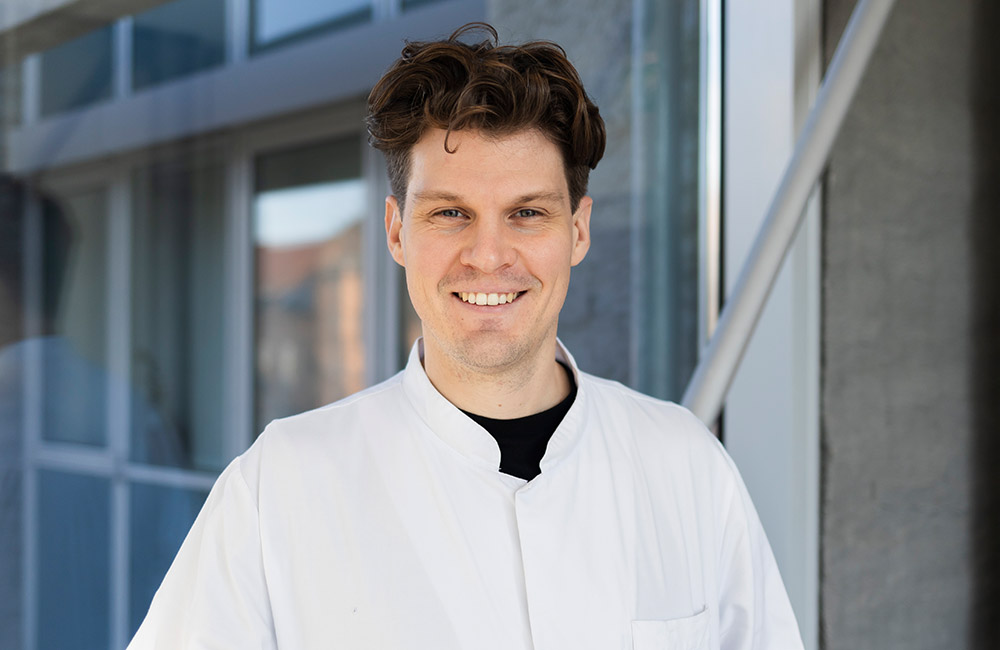Award for research into gentler therapy for appendicitis
Dr Maximilian Dölling from the University Medical Centre Magdeburg receives prestigious Novartis grant for research into the treatment of uncomplicated appendicitis
Appendicitis, colloquially known as appendicitis, is one of the most common reasons for surgical interventions worldwide. However, not all cases necessarily require surgery. Dr Maximilian Dölling, assistant doctor at the University Clinic for General, Visceral, Vascular and Transplant Surgery in Magdeburg, is working on a drug treatment that could offer sufferers a gentler alternative to surgery. He was awarded the Novartis Foundation Graduate Scholarship for Therapeutic Research for this pioneering research.

Photo: Magdeburg assistant physician Dr Maximilian Dölling receives a prestigious graduate scholarship from the Novartis Foundation for his research into the treatment of uncomplicated appendicitis. Photographer: Sarah Kossmann/University Medicine Magdeburg
Dr Dölling's research concentrates on so-called uncomplicated appendicitis, a form of appendicitis in which the appendix is not ruptured and there is no acute emergency. His focus is on the dissolution of so-called soft appendicoliths - small deposits in the appendix that are very difficult to recognise in imaging and are therefore often overlooked. ‘Our research shows that these fine deposits have been underestimated to date. They could play a decisive role in why antibiotics do not work in some cases,’ explains Dr Dölling. ‘The aim is to develop a drug treatment that is both gentler and more effective for those affected. This could not only reduce the burden on patients, but also prevent relapses and thus reduce healthcare costs.’
An enzyme as the key to therapy
In his approach, Dr Dölling focuses on the use of DNase I to dissolve the appendicoliths. DNase I is an enzyme that breaks down so-called neutrophil extracellular traps (NETs), which could play a role in the formation of appendicoliths. In a pilot study, Dr Dölling will investigate the effect of the enzyme on these deposits in the laboratory. ‘If we succeed in dissolving the deposits, we could offer patients who are unable to undergo surgery due to pre-existing conditions or other risk factors a gentle alternative to surgery,’ explains Dr Dölling.
Previous conservative treatment approaches based on antibiotics have reached their limits, particularly in the presence of appendicoliths. Dr Dölling's research could therefore initiate a paradigm shift in the treatment of appendicitis.
For his research, Dr Dölling works with an interdisciplinary team from the fields of surgery, molecular biology and experimental research. ‘The exchange with experienced colleagues and the excellent research network at Magdeburg University Hospital are crucial for the progress of our work,’ emphasises the young scientist.
For the young scientist, the award of the 8,000 euro scholarship is not only recognition of his work to date, but also motivation for the future: ‘It is a great honour and confirmation that I can continue to develop my ideas and improve the treatment of appendicitis in the long term.’
Background Appendicitis (inflammation of the appendix)
Appendicitis is one of the most common acute diseases of the abdomen. It is not the appendix itself that is inflamed, but its so-called appendix. Typical symptoms are abdominal pain, nausea and fever. In industrialised countries, 7 to 9 percent of the population suffer from this disease. Complicated cases in which the appendix ruptures are considered particularly critical, as they can lead to serious complications such as peritonitis or blood poisoning. In Germany alone, over 135,000 appendectomies are performed every year.
About the person
Dr Maximilian Dölling, born in Hesse, studied medicine at the University of Split - School of Medicine in Croatia and at the University of Erlangen-Nuremberg. He is currently undergoing specialist training in visceral and transplant surgery at Magdeburg University Hospital. Dölling took part in the renowned Global Clinical Scholars Research Training Programme at Harvard Medical School from 2022 to 2024, which he completed with distinction. His doctoral thesis entitled ‘The influence of hypoxia on Neutrophils and Neutrophil Extracellular Trap formation’ was awarded the top grade of ‘summa cum laude’. His research was funded by a scholarship from the German Research Foundation (SFB 1181), which he received as part of the graduate school from 2017 to 2019.
Graduate scholarship from the Novartis Foundation
The Novartis Foundation Graduate Fellowship for Therapeutic Research was established in 1992 and is awarded to promising young researchers who have already made a name for themselves through outstanding achievements and are seeking a career in science. The scholarship is endowed with 8,000 euros and is open to all medical specialisms and research topics. From 2022 to 2024, the universities in Düsseldorf, Hanover, Leipzig, Magdeburg and Ulm will award a scholarship each year and nominate a candidate.
Contact
Dr. med. Maximilian Dölling, Assistant doctor at the University Clinic for General, Visceral, Vascular and Transplant Surgery in Magdeburg, E-Mail: maximilian.doelling@med.ovgu.de






